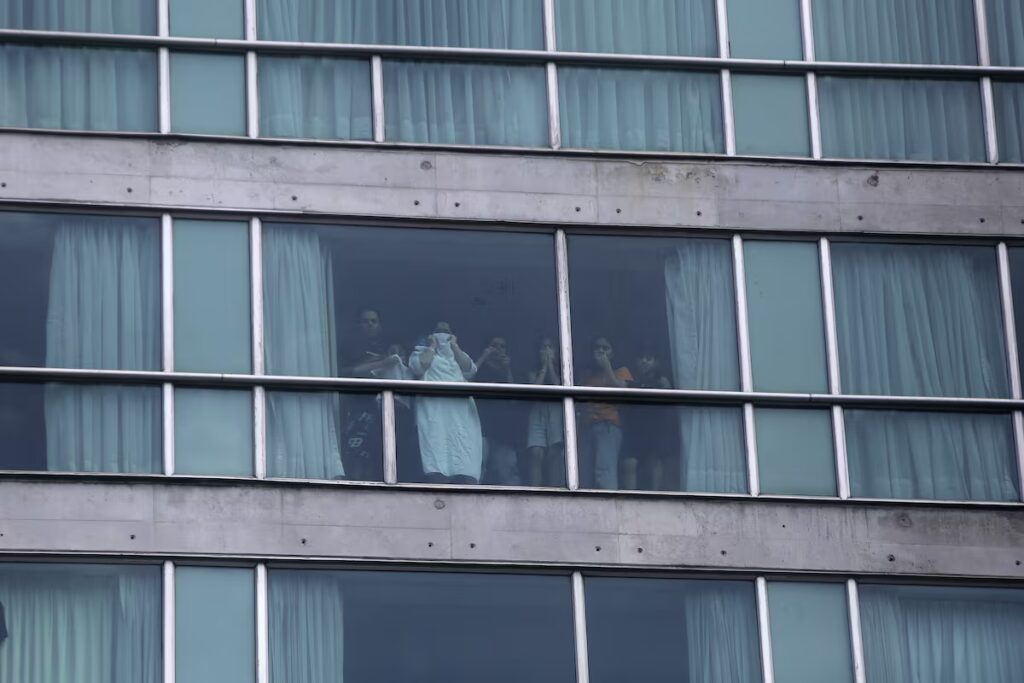
Secrecy and the loss of contact with family members and lawyers have characterized the deportations to third countries that Donald Trump’s government has carried out as part of its campaign against immigrants. The tone of the expulsions was the uncertain fate and conditions to which those sent to countries with which they have no ties and where there is no guarantee of respect for human rights were subjected. Over time, many of them ended up in the countries from which they had fled and where they suffer persecution or torture. This is the case of Rabbiatu Kuyateh, who made headlines for a video that went viral showing the mistreatment she suffered. It shows this 58-year-old nurse from Maryland being violently dragged across the floor by men who appear to be officials from Ghana, the country where she was deported days earlier. Kuyateh resisted in vain so that she would not be sent to Sierra Leone, the country where she was born and from which she fled and where she is currently hiding.
Theirs is a story like that of many migrants who, due to the Administration’s stratagems, ended up in the countries from which they had fled without the US government overriding protection by sending them directly there. They did it through another government, like that of Ghana. The White House claims to have had assurances that people deported to this African country would not be sent back to their country of origin, but there is much doubt that this is the case. And even more so after the Ghanaian government itself denied the existence of such an agreement. Immigration experts see it as a strategy by Washington to hedge its back against potential disputes.
“It was the solution to a problem: ‘We can remove those people from our custody and at the same time not break the law,’ explains Alexandra Williams, one of the lawyers on the team defending Kuyateh, to EL PAÍS. The Sierra Leonean arrived in the United States 30 years ago fleeing the war in her country, where, due to her family’s political activity, she suffered torture and persecution.
She worked as a nurse in Maryland, where she had built a life. Their now adult son was born in the United States, while his parents were naturalized Americans. Kuyateh, for his part, had a work permit and was under surveillance, but it was enough to show up annually for immigration checks. Everything seemed in order. “He went to those appointments every year, to confirm that he was still in the country. He has no criminal record and his address was up to date. He never missed his appointment,” says Williams, who explains that his client was protected from deportation to Sierra Leone.
That all changed with the Trump administration and their nomination in July became an ambush. “They told her that because of changes in the administration and its policies, they had to arrest her and take her out of the country, because she had a deportation order,” Williams says.
Her son never saw her again. She was detained and, after a few days, transferred to a detention center in Louisiana. The next destination was Ghana. On the flight she was accompanied by other migrants, handcuffed and handcuffed, like her, with the same uncertain fate. On the phone he told his son about the brutality with which they were treated, also marked by the wounds on his body.
The African country is one of the last that the Trump administration has chosen to send migrants who cannot return to their places of origin because they have a court protection order that prevents it. According to the organization Human Rights First, which tracks deportation flights, the United States has conducted at least 21 flights with people from third countries to 10 destinations: Costa Rica, El Salvador, Swaziland, Ghana, Guatemala, Honduras, Panama, Rwanda, South Sudan and Uzbekistan. Additionally, there have been thousands of transfers to Mexico by land.
Immigration and Customs Enforcement (ICE) tries to carry out transfers secretly and as quickly as possible. In April, Massachusetts federal judge Brian E. Murphy issued a preliminary order saying the government must give people at least 15 days to challenge deportations to third countries, where they could face retaliation. However, two months later, the Supreme Court granted a stay, overturning Murphy’s order.
Human rights organizations say this violates a fundamental concept of American and international law that prevents deporting people to places where they could suffer torture, persecution or other serious harm. But the Administration does not give detainees time to express their fears, as happened to Kuyateh, who was not allowed to express her fear of being deported to Ghana, much less Sierra Leone.
From the organization AMICA they underline that in recent weeks deportations to third countries have increased and then to be sent back to the countries from which they had fled. “There are a lot of people in this position. Many of them have been deported to Mexico and are at risk of being sent back to their country of origin,” says Kelly Rojas, an immigration attorney at AMICA. Rojas doesn’t want to provide specific cases because of concerns about his clients’ safety. One of them was also sent to Ghana and later transferred to the West African country from which he had fled, despite a protection order preventing him from doing so. When he was deported, the lawyers lost contact and, as often happens, got no information about where he had been sent. “This person disappeared from the system. We called several ICE offices, who told us several things about where he had been taken,” Rojas says.
Maintaining contact once they arrive in their countries is complicated and continuing their defense is very difficult, since immigration lawyers can no longer practice. In these cases, you should try to contact other local human rights organizations who continue your advocacy. Fatigue and desperation lead many to give up. “What the US government is doing right now is killing the will to fight for their rights. Some clients deported to their home countries have been detained for so long that, although their lives are in danger – which is why a judge in the US gave them protection orders – they think that at least they are no longer in the detention center,” says Rojas.





